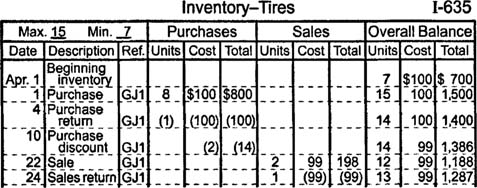Inventory Subsidiary Ledger Accounts
Companies that use the perpetual system maintain an inventory control account and an inventory subsidiary ledger with separate accounts for each type of item the business sells. Whenever a transaction affects inventory, the specific item's subsidiary ledger account is also updated. Inventory subsidiary ledger accounts usually contain separate sets of columns for purchases, sales, and the account balance. Each set has three columns, which are used to record the number of units, the cost of each unit, and the total cost. The inventory‐tires account from the previous example appears below.

The numbers in the maximum and minimum fields near the upper left corner of the account are optional control fields designed to prevent the company from having too many or too few of the items in stock. In this example, the company purchases new tires whenever the overall number of units in stock drops to seven or less, and the number purchased should never cause the company's stock to exceed fifteen units.
If you study the journal entries on the subsidiary ledger account immediately previous, you will notice that the cost of the tires sold on April 22 changes from $100 in the journal entries to $99 in the inventory account. These examples illustrate two different cost flow methods, so they are intended to be used for illustration purposes only. A company must use one cost flow method consistently.